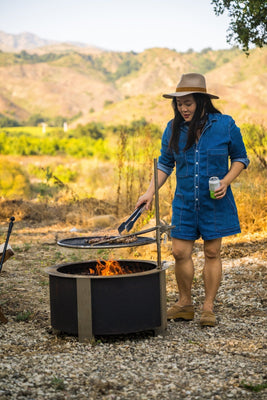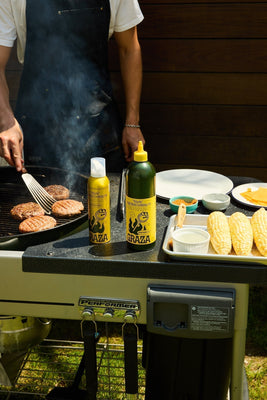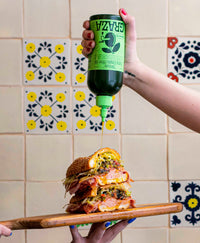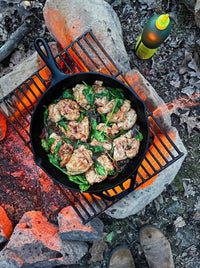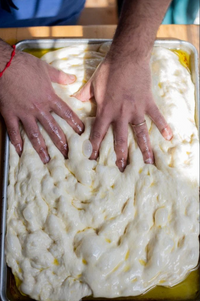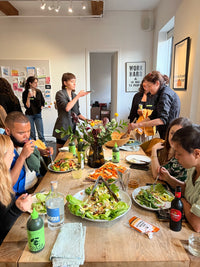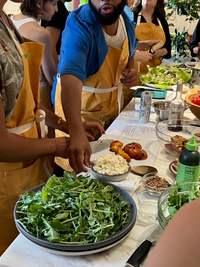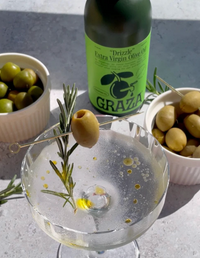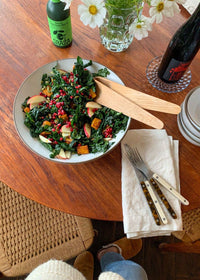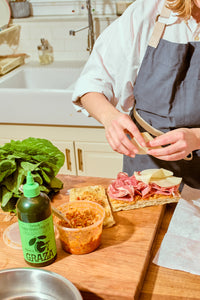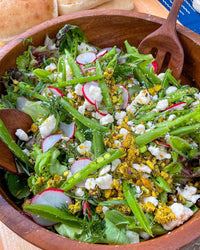
Cooking Hacks with Chef Kia Damon
Kia’s tackling your most pressing kitchen questions—including the topic that “has left relationships, friend groups, group chats and even Twitter, in absolute shambles.” Read on for the inside scoop!
by Kia Damon | @kiacooks
If you don’t know her yet, you’re in for a TREAT! Kia Damon, aka @kiacooks is the force behind some of the tastiest pop-ups around (ever heard of her Florida Water tour??) AND a mutual aid effort focused on fighting food insecurity: Kia Feeds the People. We’re pretty big fans.
Ask Kia!
Q: Cleaning meat? To do or not to do.
Kia's Answer: Cleaning meat is a topic that has left families, relationships, friend groups, group chats and even Twitter, in absolute shambles. My mother and I got into a tit for tat over it last time I was home. There are many cultures that practice cleaning their meat, specifically poultry, with vinegar and lemon for their own reasons. Here’s the thing though—it’s not necessary and it could cause your kitchen more harm than good. Salmonella can find its way all over your kitchen in the water that’ll splash. It just isn’t very safe.
It’s okay to trim your meat, pluck any feathers off and pat off excess blood and moisture with a paper towel. If your meat is looking slimy and like it needs to be washed before cooking then it’s probably unsafe for eating anyhow. Besides, if there’s anything harmful going on with your meat, I promise water isn’t going to do a damn thing about it.
Q: Are there cookbooks I should reference as an aspiring home cook? I exclusively eat out…
Kia's Answer: There are so many cookbooks out there, but I’m going to point you in the direction of one incredible, knowledgeable homecook: Angela Davis aka The Kitchenista. She has several ebooks available ( that are a fraction the cost of a printed cookbook) and a flourishing Patreon community. Her recipes help newbies build a solid foundation so they can cook with confidence. Angela’s books are my number one suggestion!
Contrary to popular belief, you cannot and should not eat leftovers all week.
Q: How do I know if food, especially stewed meat, is rotten?
Kia's Answer: Hm! Interesting question. If we’re taking raw uncooked meat, chances are the smell will tell you everything you need to know. If you take a whiff and your nose scrunches up, it’s past its prime. If the meat is cooked, the smell will also knock the wind out of you. In the chance that you can’t smell anything off, but you’re unsure if it’s safe to eat, consider how many days it’s been since it was prepared. Contrary to popular belief, you cannot and should not eat leftovers all week. The max is 3 days. Some say 4, but I don’t like to chance it. Practice safe prepping, cooking and storing and you’ll be just fine.
Q: I want to use nice vinegars and oils more often but I don’t know when or how!
Kia's Answer: Acidity and fat are two pillars of cooking according to our Patron Saint of Culinary Knowledge, Samin Nosrat. Learning how to harness these pillars will open up a world of flavor for you. Vinegars (acid) are a great way to brighten up your food while finishing oils(fat) are clutch for rounding flavors out and adding depth. An easy beginners way to incorporate vinegars is in salad dressings. Think of fancy vinegars when you want to add some pizzazz to a dish that could be heavy on the tongue. Like malt vinegar on fries or champagne vinegar on a roasted chicken with pan sauce.
My favorite way to use fancy oil is for roasted salmon. I have a basil oil and a Calabrian chili oil that comes in handy when I need a quick, but not too basic, meal. Try using oils on pizzas too. When I use an oil, I want someone to taste my food and go “ hmm, what is that additional flavor resting on the back of my palette, providing a dynamic layer to this bite?” Have fun, experiment!




